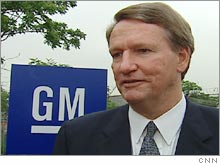|
GM chief: End to job guarantees needed
GM's Wagoner says GM to seek end to job guarantees for union workers, but not sure he can win deal.
DETROIT (CNNMoney.com) - General Motors Corp. Chairman and CEO Rick Wagoner said he would like to see an end to job guarantees for members of the United Auto Workers union at GM, but he wouldn't comment on his chances to win such a contract change in the 2007 labor negotiations. Speaking to reporters at the North American International Auto Show here Sunday, Wagoner said the job guarantees, known as the "jobs bank," is one of the competitive problems facing the embattled No. 1 automaker as it competes with overseas automakers who don't have those guarantees to employees.
The jobs bank pays UAW members who are laid off from GM, Ford Motor Co. and Chrysler Group close to full pay, which has slowed Big Three efforts to close plants and cut excess capacity. "I don't think it's any question the jobs bank is an expense," said Wagoner. "Anywhere where we're not competitive with the people we're running hard against, the non-represented companies, we need to sit down and work with UAW on the best ways to make sure we're competitive. I think it's clearer than ever it's in our interest and theirs, but we do have to do it jointly." Spokesmen for the UAW were not available for comment Sunday. GM announced plans in November to close 12 plants and facilities and cut 30,000 hourly jobs, but many of those closings will come after the current UAW contract, and current job guarantees, expire in September 2007. GM is closing the plants and seeking other cost cuts in an effort to stem billions in annual losses from its core North American auto operations, losses that have plunged its credit rating into junk bond status and prompt talk of a possible bankruptcy filing for the automaker. Wagoner repeated earlier statements Sunday that the company has no plans for such a filing. GM will not disclose how many UAW members are now in the jobs bank, but some estimates have put the number at close to 5,000, and that number could increase as some facilities are closed before the 2007 labor contract expiration. Estimates have also put the cost of paying those 5,000 employees close to $500 million annually, for their pay guarantees and benefits. That equates to more than $100 per car for every vehicle GM sold in the United States last year. Some analysts have suggested that GM (Research) restructuring plans don't go far enough in addressing the need to cut costs and stem billions in annual losses it is now seeing at its core North American auto operations. Wagoner praised the UAW leadership for its work in negotiating cost savings with GM related to health care spending by the company for active and retired employees and their family members. GM estimates it will cut the $5.6 billion it is now spending on health care by $1 billion a year due to the cost savings agreement with the union, which is now awaiting court approval. "I think the UAW, to their credit, have really shown over the last year that they are willing to work constructively to address the importance of being cost competitive," he said. He said he would not speculate on his chances of winning an agreement from the union to eliminate the jobs bank in the next contract. "There's a lot of issues that we need to discuss in the next contract," said Wagoner. "There's a lot of improvement we see possible in cost competitiveness, even between now and the next contract. We want to keep working every day on it and not wait till Sept. 07 to work on it." David Cole, chairman of the Center for Automotive Research, agreed with Wagoner that the jobs bank is one of the serious problems facing GM's competitive position going forward. But he said that an aging GM work force, with the average age of the hourly worker a little less than 50, and the cuts already announced by GM could make the jobs bank less of a burden in the future. "The attrition rate is going to do it anyway," he said. "Because of retirements, the jobs bank becomes almost academic." The cuts announced in November by GM will take its annual North American capacity down to about 4.2 million vehicles with plants working at capacity and two shifts of workers. That's less than the 4.5 million vehicles it sold in the United States last year. Cole said that GM will likely use cash buyouts to employees affected by the plant closing plans to reduce the number of UAW members in the jobs bank. "If you can eliminate the jobs bank by buyouts, you can leave the language in the contract and get something of greater economic value at the negotiating table," said Cole. "I think the jobs bank language will probably be in the next contract, but there will be virtually nobody in it." Cole said that union leadership faces backlash from some rank and file members for agreeing to the health care cost cutting measures. Some UAW members were protesting outside the auto show on Sunday, with Reuters reporting that one of the signs read, "Corporate America and Labor Leaders: Traitors of the People" That political pressure within the union could work against the leadership agreeing to end the job guarantees Cole said. "It's important for the union that GM not have uncompetitive labor costs. Management understands that and union leadership understands that. But rank and file is only starting to understand that," said Cole. "At the end of negotiations, management has to give the union leadership the opportunity to run around the block waving the V for victory."
For more news for the Detroit auto show, click here. |
|


